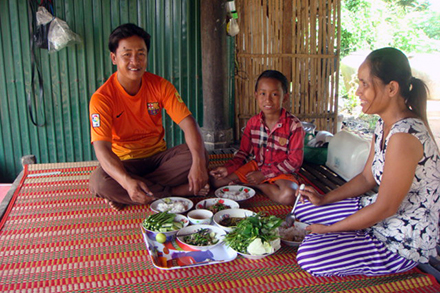In 1990, 89 percent of Cambodians did not use toilets. Over the past 25 years that rate has decreased to 47 percent.

Sanitation is crucial for good health and nutrition, especially for children. Heifer International’s Theory of Change is made up of five dimensions, one of which being a focus on improved food security and nutrition. As sanitation is an indicator of progress that applies to all Heifer’s projects, Heifer Cambodia is committed to work with project partners to promote sanitation through trainings and other campaigns.
In January 2013, Heifer Cambodia implemented the Promotion and Protection of Women’s Rights and Women’s Social Economic Empowerment project with funds from the European Union (EU) in Boeung Khna Commune, Bakan District, Pursat Province. Most villagers in Boeung Khna depend on animal raising, crop production, small-scale businesses and other agriculture activities as their main source of income. They are largely unaware of their effect on the environment and good sanitation practices, and most do not have a proper latrine. For some families the latrine is equivalent to the bushes near by their houses. Anywhere the sanitation is poor, children’s health is at risk.
Mrs. Duk Pisey, 35, her husband So Hong, 35, and their two children joined the Chamroeun Phal self-help group (SHG) in Prey Damrey Village in 2013. Like many families around them, Pisey’s family went to the bushes within a 100-yard perimeter from their home. The latrine bushes were dirty and smell rancid of human waste, especially during the raining season when most of people in her community also went there too. Pisey said she was often concerned for the safety of her women and girls in her community, especially at night.
All of that has changed for Pisey, she told Heifer with a proud smile.
“I spent about 2 million riels (about $500) to build a proper latrine and bathroom,” Pisey said. “That isn’t a small amount of money, by any means, and I never would have dreamt that I could save it. However, after attending the 12 Cornerstones training, I realized my family needs a latrine and bathroom, so I discussed it with my husband, and we started to save the money.”
Ms. Kong Ratha, community facilitator, said these positive changes stem from an internal change in attitudes toward improving the sanitation in the home environment and a commitment to change their behavior.
“Since we have joined the group and installed the latrine, my family is healthier and keep the house clean,” Pisey said. “And we don’t have to worry about the safety of going to the bushes at night.”
The awareness of the need for sanitary bathrooms has transformed Pisey’s community. She said several families have built their own latrines and more are already putting money aside.
“If we wanted to have a latrine and a bathroom, we needed to plan for it, and I’m glad we did. My family is happy as we now eat healthier thanks to our improved hygiene and sanitation,” she said.
Story by Hem Kong, Project Coordinator, Heifer Cambodia
Translated by Khiev Sadeth. Program Officer, Heifer Cambodia
Photos courtesy of Heifer Cambodia